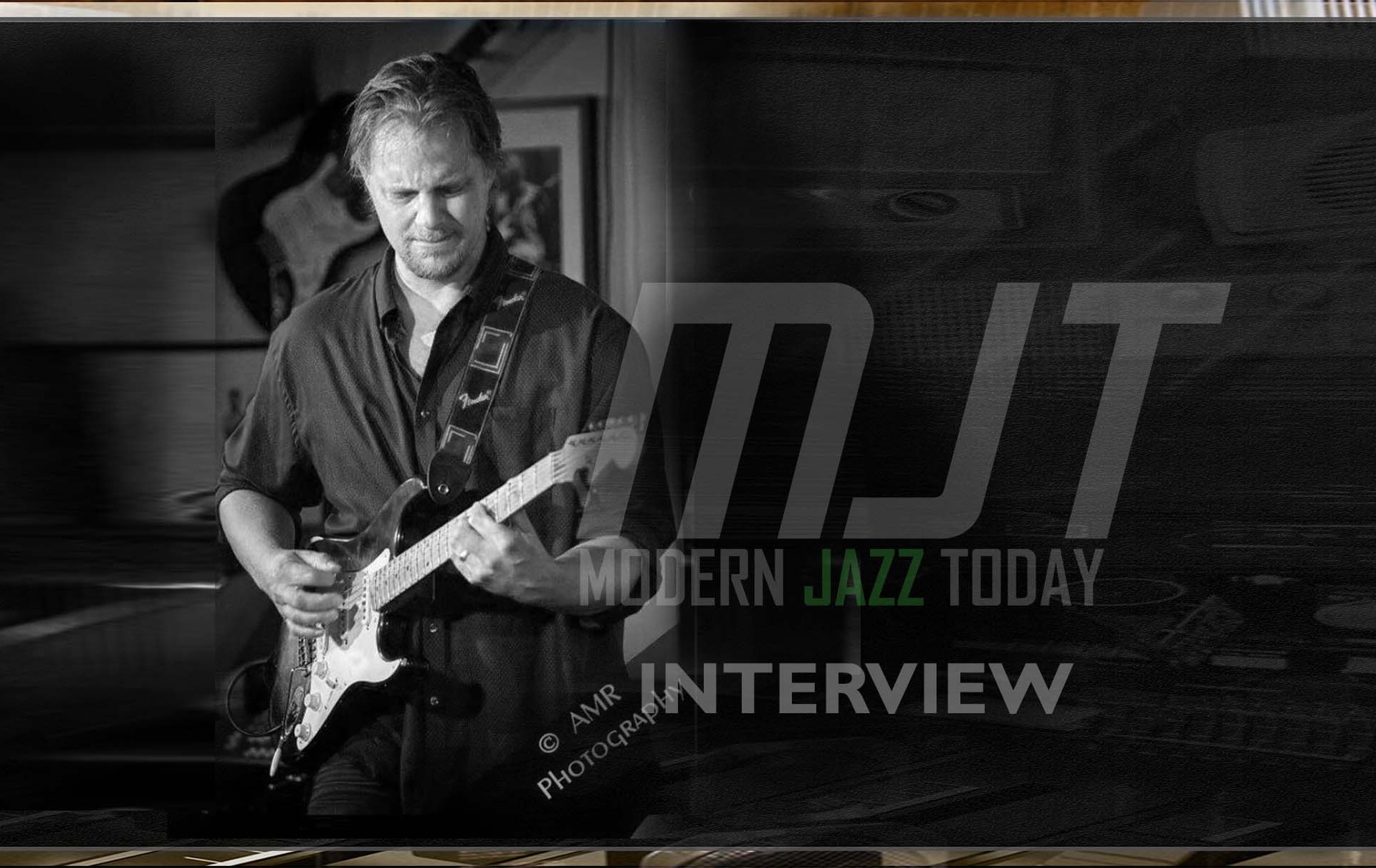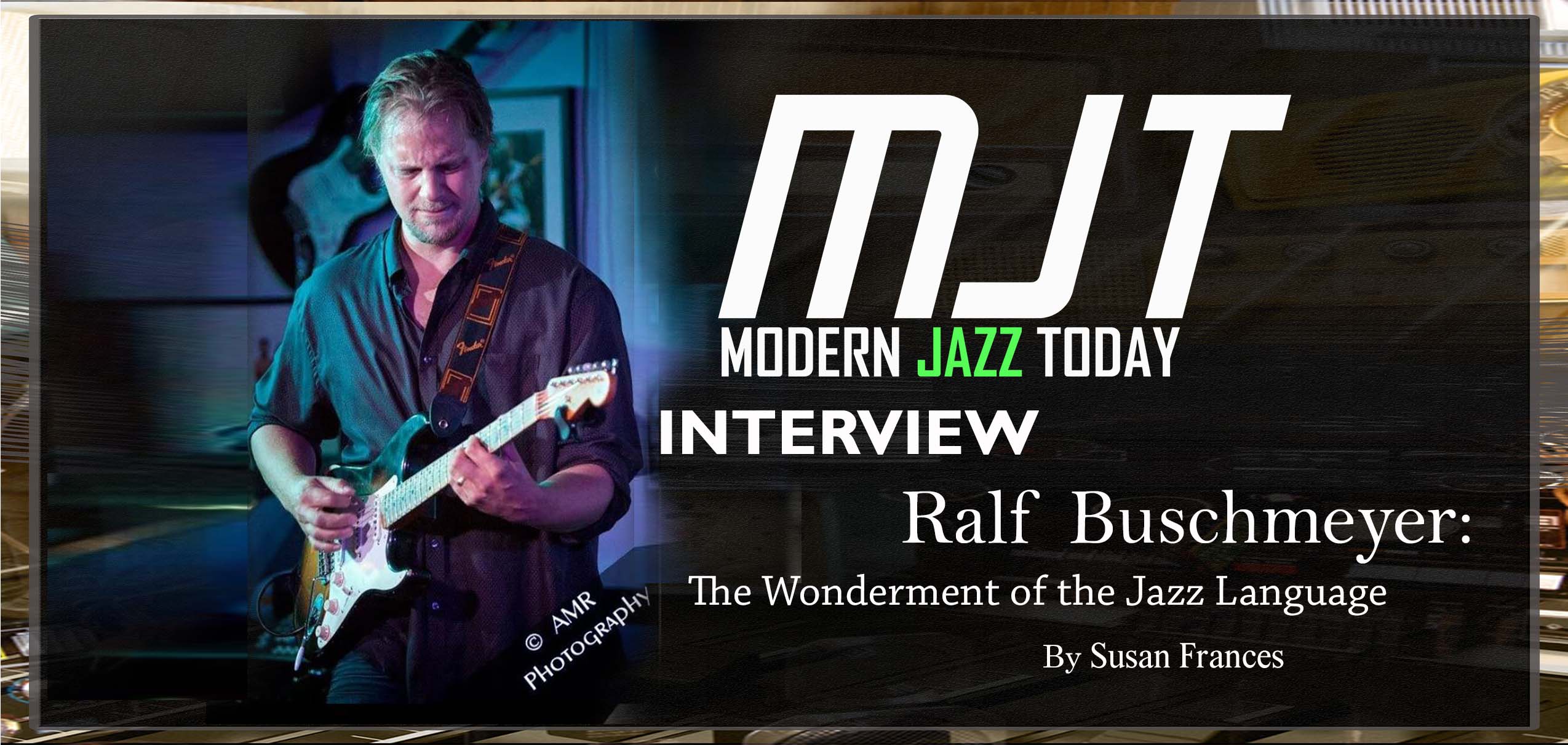Ralf Buschmeyer: The Wonderment of the Jazz Language
by Susan Francis


He recalls, “I was thinking about the nature of Jazz and how wonderful it is to just get together with people you’ve never met or possibly share a spoken language with, and this common language of music allows you to instantly create together Jazzspeak.”
“I guess I got cocky,” he discerns, “and thought that it would be fun and interesting to document first meetings with people from different regions by recording the meetings. I wanted to get a Vancouver band [to represent the] West Coast. A Toronto band [to showcase the] East Coast, and an eclectic band happened to present itself around the same time [to personify] New York/Winnipeg.”
“Between all 3,” he determined, “there was enough recorded material for a CD.”
He notes, “The Vancouver band was Bill Coon on guitar, Jodi Proznick on bass, and Jesse Cahill on drums. Toronto band was ‘Folkalarm’ with Kevin Breit on guitar, Jorn Anderson on drums, and Russ Boswell on bass. Mixed band was New York’s John Riley on drums and Winnipeg’s Michelle Gregoire on B3.”
“The only person I had met before walking into the studio,” he points out, “was John Riley, whom I’d done a few gigs with.”
The tracks on JazzSpeak are Buschmeyer’s own original material, which personalized the recording. For example, for the track “Tragic Chromatic,” he describes, “‘Tragic Chromatic’ is a culmination of ideas I had been working on. I had been using the bass line in the first 2 bars as a walking/chording sound for quite a while and wanted a melody that would be reflective of the suggested chords.”

“The title, ‘Tragic Chromatic,'” he illuminates, “is a play on the band name Manic Thematic as well as a play on the nature of Blues being highly chromatic and Blues lyrics typically reflecting some form of Tragedy.”
Another track, “Asia Vu,” which is texturally soothing with atmospheric passages, expands on Buschmeyer’s repertoire. He enlightens about the track, “The title, as many of the titles on JazzSpeak did, came from my daughter. She was quite young at the time and would mimic words without knowing entirely what they were or meant. She had some doozies that kept my wife and I highly entertained. They’re an inside joke that we still look back on fondly.”
“The song,” he reveals, “is meant to express the wonderment that my daughter would experience every day as a child. It’s beautiful to be around someone to whom everything holds fascination, and they can move from one amazement to another. The music is meant to reflect that in its simple, singable melody and floating chords that dip in and out of various keys and tonalities.”
Buschmeyer, like his own Father, has created an environment that exposes his daughter to various musical styles. He exposes his upbringing: “My Father loved music and had the stereo going all day while I was growing up. He listened to a wide mix of genres, and as I approached my teen years, I found myself gravitating toward the Blues-influenced music in his collection. Ray Charles, Eric Clapton, and Booker T & the MGs.”
“Around the same time,” he recollects, “the Blues Brothers movie came out and featured artists that I already loved. I became highly motivated to get involved in playing and find out as much as I could about current and past Blues, Rock, Gospel, and R&B artists.”
“Along the way,” he chronicles, “I furthered my interest in instrumental music. Jeff Beck’s 70’s fusion records and progressive Rock bands like Yes sparked trips to my local library’s Jazz section. After years of improv in Rock bands, I started playing in local clubs while I was still in high school. I wanted to expand my knowledge of Jazz and enrolled in a college Music Performance program. It didn’t take long before I fell in love with the music of Miles Davis, John Coltrane, Wes Montgomery, and Pat Metheny.”
It was a logical step for Buschmeyer to pursue playing the guitar. He professes, “I love the guitars’ history. How it fits into and has driven so many great genres. I love how many dynamics can be brought out through use of differing techniques. Being a chordal instrument is a big deal, and it just feels so much more rock’n’roll than a keyboard!”
“Most of my writing and arranging,” he purports, “is done on guitar, though some songs have been sparked by a bass line I’ve come up with or a chord progression that I tinkered with on keys. Most melodies have been thought out and sung before I transitioned them to guitar.”
Buschmeyer’s early musical experiences helped him to carve out a path to becoming a solo artist. He reflects, “In the ’80s, you could get your act together and join a band that played the local clubs. Live music was common at the time, and there were plenty of bands playing plenty of clubs. After a few years of jamming with friends in rehearsal spaces, basements and garages, my opportunity came.”
“At the time,” he assesses, “the only real options for kids my age were either hard rock or new wave. I didn’t like new wave with few
“After an ill-fated tour of Northern Ontario,” he remembers, “I decided to go to college to get my act together and develop skills that would enable me to be a full-time professional musician.”
“After 3 years of working with full-time touring acts,” he provides, “I settled in Calgary, Alberta. I went to work finding out who was on the scene, particularly in the Jazz genre. At the time, Calgary had an interesting gap in age regarding the Jazz musicians. Most players in town were either quite young and up-and-coming or quite a bit older and established. I was still in my mid-20s when I moved there and fit in well with the younger crowd while I gradually gained trust and acceptance with the established players.”
One of the first bands he formed was Terrain, with Alberta native Tyler Hornby on drums. Buschmeyer submits, “Tyler was a recent music school grad when I met him. He seemed more serious and committed than most people, and I believed that he was someone who would do what he said and not just talk, as is often the case. By that time, I had a few original songs written.”
He asserts, “Tyler would come to me with ideas, sometimes a bass line, sometimes a melody, and I would build from there. As things developed, we would typically write on our own, then bring mostly completed charts to rehearsals and let the band fill things out.”
“Terrain was my first experience as a band leader,” he regards, “creating recordings, booking clubs and festivals, and doing some press. It was a great vehicle to expand my writing and band interaction skills as well as get my name known in the region. Though it was never particularly lucrative, it led to several other opportunities.”

His journey continued, as he cites, “After the 2 Terrain records, I pursued a more traditional Jazz outlet with Manic Thematic. Our first recording was a duet with upright bassist John Hyde whom I’d been working with at Mount Royal college quite a bit. We went on to record a trio album with drummer Andy Erikson, mostly focusing on Bebop and Great American Songbook style originals.”
He discusses Manic Thematic’s release EST 1968, illustrating, “EST 1968 was my entry to being the sole decision maker, writer, band-leader. I wanted a rootsier version of Terrain to express styles that weren’t really appropriate for the original vision of that band.”
“EST 1968 was in many ways,” he perceives, “a tribute to my Father and the wide range of music I grew up with. Kind of a throwback to when radio was not so formatted. Keys would be focused to B3 or Rhodes to capture the 60’s/70’s sound. Any style I had played and enjoyed was on the table, and I wanted a documentation of where my life was, as captured by the front cover photographs.”
He details, “The band consisted of Chris Andrew on keys, Richard Erickson whom I had worked with in Terrain on bass, and Rob Vulic on drums. All players that have had a lot of experience on the jobbing scene and could handle the wide range of styles.”
His next recording, Renewal, released in 2009, took advantage of the surge of creativity he was experiencing. He attributes, “I had so much fun writing and playing the material from EST 1968 that I was inspired to write a series of new tracks during and after EST‘s production. I wanted to keep the momentum going, so I regrouped everyone from the original project, including the band, engineer, and recording studio.”
“This one was a bit more streamlined, stylistically,” he characterizes, “focusing more on the 70’s era of Rock and early Fusion with a nod to John Scofield and Mike Stern. The influences of Steely Dan, 70’s Jeff Beck, and Eric Clapton, particularly ‘Like That,’ were at play, and I brought in guest vocalist and my wife Corinne Plomish on 2 tracks that we co-wrote.”
He gleans, “By the time Renewal came out, I had a series of original Bebop tunes that hadn’t been played.” Some of these tracks
He admits, “I learn new things all of the time, and I never stop playing. I’ve learned how to feel confident with the skills I’ve developed and how to fit into a band dynamic. My awareness of what’s happening around me and how I can contribute is always key.”
“Composition,” he examines, “has allowed me the chance to see how genres are defined and how to honor each genre by knowing its history, harmonic/rhythmic content, and operating within its traditions while looking for the possibilities of creativity and advancement. It takes a long time to fully understand a music form and even longer to find your own voice within the form.”
He proposes, “Enjoy the ride; you may be here for a while.”
“I really don’t do much outside of music,” he confesses. “I practice as much as I can and do quite a bit of extra work notating things for students, doing recording projects, and prep for upcoming gigs. If I’m not directly involved with music, I’m spending time with my family as well as getting some exercise in by walking the dog, swimming or yard work. I squeeze in some reading when I can, often by keeping a book in my car.”

“At a certain point,” he confides, “I couldn’t help but notice that I was no longer the young guy in the band. By that time, I’d been teaching at various universities and colleges and was quite thrilled to see my own students coming up through the ranks of the professional world. Having a great student keeps me in touch with the fire I had for learning when I was in a music program. It’s infectious, inspiring.”
He prioritizes, “Respect for elders is a key to a civilized and functioning society. My teachers were excellent examples of what to strive for in artistry and were a huge source of inspiration to work hard toward my musical goals. Being the young player in a band is a great opportunity to fast-track learning. I’ve learned so much from being a student in the classroom as well as on the bandstand.”

Buschmeyer has given back his personalized blend of blues, adult pop, bebop, and soft rock, producing a musical hybrid that is aesthetically joyous and texturally earthy. The wonderment of the jazz language continues to spark his creativity, enticing him to work with musicians that are familiar as well as new to him. Opening oneself in such a way is a vital trait of the jazz spirit, making such releases as Miles Davis’ Birth of the Cool, Pat Metheny’s Watercolors, Dave Brubeck’s Time Out, and Ralf Buschmeyer’s JazzSpeak possible.
As Buschmeyer postulated, “Enjoy the ride; you may be here for a while.”
About Susan Frances:






No Comments